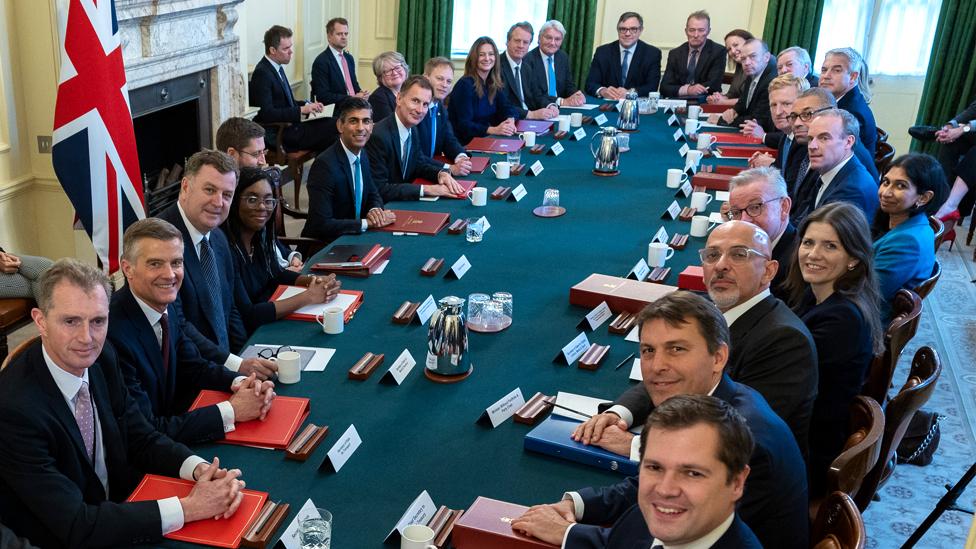
What factors does a Prime Minister have to consider when choosing a Cabinet? – Politics Teaching

Choosing a Cabinet is a Royal Prerogative power. Unlike in the United States, for example, Cabinet appointments are not subject to approval by the legislature. Selecting a cabinet is one of the most important jobs any Prime Minister has to undertake. A strong and united government is a pre-requisite for political success and stability for a Prime Minister. So what factors does a Prime Minister have to consider when selecting a Cabinet?
What factors does a Prime Minister have to consider when choosing a Cabinet?
Prime Ministers need to consider a variety of factors when selecting a Cabinet:
- They will need political allies in key positions
All Prime Ministers feel the need to place political allies in key positions. This guarantees them a supporting voice during difficult Cabinet discussions and gives them people within the Cabinet that they can implicitly trust.
Examples of this include:
- George Osborne appointed David Cameron’s Chancellor of the Exchequer. Osborne and Cameron had been close friends since their time at Oxford University.
- Theresa May appointed Damien Green as First Secretary of State. They had been friends since their time at Oxford University.
- Tony Blair appointed Lord Falconer Lord Chancellor. At the time, prior to the Constitutional Reform Act (2005) this was a very powerful role. They had been flatmates in the 1970s when they were both young barristers.
2. They need to represent wings of their party that they are less in touch with

Whilst it may be tempting for Prime Ministers to pack their Cabinet with figures who share their political philosophy, it is important for Prime Ministers to show their party that their Cabinet reflects the make-up of the wider party.
Examples of this include:
- Margaret Thatcher appointed Michael Heseltine as Deputy Prime Minister. Whilst Thatcher represented the New Right wing of the party, Michael Heseltine identified as a One-Nation Conservative. His position was an olive branch to those in the parliamentary party who did not fully align with Thatcherism.
- Harold Wilson included Tony Benn in his Cabinet. Benn advocated far more radical socialist policies than Wilson, and this appeased the far-left of the party.
(It is worth noting that this often happens automatically within the Labour Party. Within the Labour Party the Leader and Deputy Leader are elected separately and there is a tendency for them to come from different wings of the party. This can be seen currently in the case Keir Starmer and Angela Rayner and with Tony Blair an John Prescott).
3. They need to reflect the political realities of the time

Sometimes the wider political circumstances of the time place a significant burden on the PM in the selection of their Cabinet. There may be divisive issues that need to be carefully managed.
Examples of this include:
- When appointing her first Cabinet Theresa May had to be extremely conscious of the Brexit vote in which 17.4 million people voted to leave the European Union. As a Remainer, she also needed to ensure that she was seen to be giving Leavers key positions in her Cabinet. For example, she appointed Boris Johnson as Foreign Secretary and David Davis as Secretary of State for Exiting the European Union.
- After the 2010 General Election, David Cameron was forced to form a Coalition Government with the Liberal Democrats. As part of the Coalition Agreement, a number of Cabinet positions went to Liberal Democrat MPs. This meant that Nick Clegg, Vince Cable, Danny Alexander and others joined Conservatives in the Cabinet.
4. Some Cabinet Members may be appointed due to their vast experience
Prime Ministers will also want to ensure there are wise old heads in the Cabinet, particularly when they are inexperienced in governance. Prime Ministers need figures around them who have ‘institutional memory’ and can help put political situations in their historical context.
Examples of this include:
- David Cameron appointed Ken Clarke to be Justice Secretary in his Cabinet of 2010. In the year of his seventieth birthday, Clarke was a respected grandee in their party and someone who himself had run for leadership of the party three times. He had served in senior positions under both Margaret Thatcher and John Major. As such, he was someone who could offer sage counsel to the Prime Minister.
- When Tony Blair became Prime Minister the Conservatives had been in office for 18 years. This meant few of his Cabinet had any governmental experience (including Blair himself). This made it hard for Blair to make appointments based on this factor. However, his decisions to include Gavin Strang and John Morris in his Cabinet may have been influenced by this factor.
5. They need to keep political rivals close
As the saying goes, “keep your friends close, and your enemies even closer”. Prime Ministers may decide it is better to give their political rivals a key position where they have some control over them. Whilst in Cabinet, Ministers are constrained by collective responsibility and have to publicly support the Prime Minister. As another saying often attributed to US President Lyndon B Johnson goes, “it is better to have someone inside the tent pissing out than outside pissing in…”. Prime Ministers therefore may choose to include their key political rivals in the Cabinet.
Examples of this include:
- Without any doubt the best example of this is the appointment of Boris Johnson under Theresa May. It was clear that Johnson was a rival for May’s leadership and she decided that appointing him to a senior Cabinet position (Foreign Secretary) may keep him on the leash. As it turned out, even from within the Cabinet Johnson was critical of May and penned damaging articles about her leadership for the Daily Telegraph.
- The appointment of Michael Heseltine by Margaret Thatcher is another example of this. Heseltine was seen as an alternative to Thatcher by many in the Conservative Party and she could not afford to have him on the outside being able to criticise her restriction. Indeed, when Heseltine left the Cabinet in 1986 he became a thorn in Thatcher’s side and eventually challenged her for the leadership in 1990, precipitating her resignation.
(In the case of Tony Blair and Gordon Brown, it is unlikely Brown was appointed to the Cabinet for this reason. However, whilst in government their relationship deteriorated significantly, to the extent that during the second term in office they were no longer on speaking terms. At this point, Blair’s decision to keep Brown as Chancellor was undoubtedly influenced by this factor).
6. Some Ministers will be bought into the Cabinet because they are being fast-tracked to the top jobs
Sometimes Ministers are bought into the Cabinet early in their career because it is expected they will have a big future in the party. Consequently, these figures can quickly rise to the top jobs.
Examples of this include:
- David Miliband was appointed DEFRA Secretary in 2006. This is despite the fact that he was just 41 and had only become an MP in 2001. It was expected that Miliband would be a future leader and in 2007, after just a year in the Cabinet, Gordon Brown appointed him to be Foreign Secretary.
- Ed Balls was a key economic advisor to Gordon Brown in the Treasury but then became an MP in 2005. Just two years later he was appointed Education Secretary by Gordon Brown and it was widely expected that he would one day be appointed Chancellor by Brown.
- Rishi Sunak became an MP in 2015 but by 2019 he had been appointed Chief Secretary to the Cabinet and in 2020 became the youngest ever modern Chancellor aged just 39.
7. Some Ministers may be appointed because they are simply deemed to be competent
Alongside the other factors that need to be considered, Prime Ministers also need to simply have good Ministers in their Cabinet. This is particularly the case for briefs that traditionally have been tricky or that the Prime Minister is placing a particular emphasis on.
Some examples of this include:
- David Cameron chose Oliver Letwin to work in the Cabinet Office because of his skill as an administrator. Whilst a figure who was not well publicly known, those who worked with him knew how effective he was.
- Philip Hammond served in a number of prominent positions in government including Chancellor of the Exchequer, Foreign Secretary, Transport Secretary and Defence Secretary. Whilst Hammond was never considered to be a particularly charismatic figure, he was very much considered a reliable departmental leader.
8. Prime Ministers also need to consider the descriptive representation of their Cabinet
Increasingly Prime Ministers need to consider the descriptive representation of their Cabinets. The publicly expect that their political leaders reflect the make-up of the nation and a Cabinet that is made up of white middle-aged men is likely to be criticised. Many recent Cabinets have therefore been a better reflection of demographics of the nation.
For example:
- Liz Truss’ short-lived Cabinet had the distinction of being the only one in which none of the four Great Officers of State was held by a white male. Overall, it was the most demographically diverse Cabinet in history.
- Tony Blair’s first Cabinet in 1997 broke boundaries with more women than ever before. In addition, David Blunkett was appointed the first blind Cabinet Minister and Baroness Amos was the first black female Cabinet Minister.
Article Summary
A number of factors need to be considered when appointing a Cabinet and it is one of the decisions over which the Prime Minister will spend the most time. However, different PMs will place an emphasis on different factors and the political circumstances of the day will impact this, there is always a wide-range of considerations that need to be made.
Key Terms
Cabinet - The body made up of the Heads of Government departments in the UK which makes collective government decisions.
Minister - A member of the Government. The most senior Ministers sit in the Cabinet.
New Right - A strand of conservatism which highlights individualism and free markets.
One-Nation - A strand of conservatism which highlights the importance of social responsibility and paternalism.
Coalition Government - A government made up of two or more parties. They are unusual in Britain but there was a Conservative-Liberal Democrat coalition between 2010 and 2015.
Coalition Agreement - The agreement signed between the Conservatives and Liberal Democrats in 2010 to enable a programme for Government.
Institutional Memory - Learned experience from having done the same, or a similar, job in the past.
Descriptive Representation - The demographic make-up of an organisation.
Specification Links:Edexcel: Paper 2 - 3.3.1 (Prime Minister and Executive)AQA: Paper 1 - 3.1.1.3 (The Prime Minister and Cabinet)WJEC: Paper 1 - 1.2 (The Government of the UK)
Link nội dung: https://career.edu.vn/the-prime-minister-is-to-consider-a53405.html